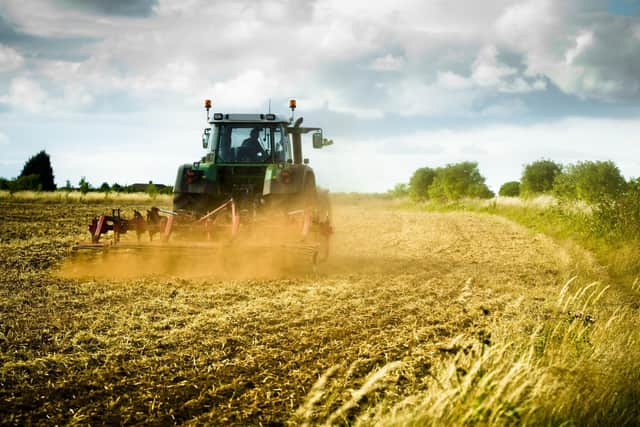Farming doesn’t need a sticking plaster, it needs understanding - Sarah Todd
To this country’s disgrace it is our nation’s first food strategy for 75 years and is basically a drive to increase domestic production to guard against future economic shocks and crises.
It seems to have taken Brexit, a global pandemic and a Russian invasion to get Government finally thinking about the vulnerability of our food supply chains.
Advertisement
Hide AdAdvertisement
Hide AdTruth be told, empty supermarket shelves have been brilliant for highlighting the perils of relying too heavily on foreign food.


It might just be this red-head being over-sensitive, but there was something about this week’s publicity stunt that gave the impression that farmers had been idle; that they haven’t been making the most of their land.
Truth is a toxic mix of rising costs and red tape has hampered productivity.
Before Ukraine (the so-called barley basket of the world) was at war, farming over here seemed to be something of a dirty word. British farming policy seemed smitten with rewilding; basically shutting the gate on land and letting the weeds take over.
Advertisement
Hide AdAdvertisement
Hide AdSons (and daughters) of the soil encouraged to open up glamping sites and the like and diversify away from traditional farming.
Now they are cosying up, promising farmers planning rules to make it easier for land to be used for food production. We’ll believe that – especially in our National Parks – when we see it.
But the gist of the new strategy has heartening echoes of the wartime ‘dig for victory’ message.
However, this correspondent couldn’t help thinking of the old farming saying about towing a light harrow.
Advertisement
Hide AdAdvertisement
Hide AdGenerations of farmers have used it to describe workers who don’t put in a full day; who scratch the surface rather than getting to the nitty gritty.
Rather than ploughing deep into the roots of farming and food production this seems to be a token announcement, not worthy of any kind of fanfare.
Even Henry Dimbleby (of the broadcasting dynasty), whose review of the food industry prompted the strategy announcement, has now distanced himself from it. Mr Dimbleby declared the policy document not detailed enough to be called a strategy.
It draws parallels with other sectors that occasionally get thrust into the spotlight because of new Government strategies. Nurses and porters know what make hospitals tick. Transport problems? Talk to the truck drivers.
Advertisement
Hide AdAdvertisement
Hide AdDid advisers talk to real-life farmers or just the pen-pushers? Forgive the pun, but is there any meat on the bones?
As an aside, The Daughter recently did a survey of over 200 farmers and farm workers for her university dissertation.
Plenty came out of it, such as the very real feelings of isolation while working on modern farms because of technological ‘improvements’ leading to lone working and less face-to-face business.
But something of relevance to this strategy is that 90 per cent of respondents believed social elements of agriculture – everything from affordable local housing to the overall sense of worth of working within farming – needs to be represented within future government policy.
Advertisement
Hide AdAdvertisement
Hide AdThe farming industry is a jigsaw puzzle and tackling one element, such as food production, in isolation to other pieces is a hiding to nothing.
In short, farming doesn’t need a sticking plaster or the aforementioned light harrow, it needs understanding. Deep cultivation.
It needs less online and more listening. More clarts, less Countryfile.
Farmers know how to farm.
They just need fewer hoops to jump through; to be enabled rather than held back.
Advertisement
Hide AdAdvertisement
Hide AdThe way farming has been going it will soon be only huge factory-style farms and the move-to-the-country brigade left in rural areas.
Proper farmers, who have forgotten more about nature and the environment than anybody with a clipboard from the Department for Environment, Food and Rural Affairs (Defra) will ever know, are just as much a rare species facing extinction as Gloucestershire Old Spot pigs or White Park cattle.
Meanwhile, poor Prince Charles has been in trouble for allegedly commenting on the controversial Rwanda policy for asylum seekers.
On the subject of farming, the Government would be well advised to actually seek the heir to the throne’s opinion. Just as he has been on the environment, His Royal Highness is ahead of the curve when it comes to understanding farming.
Advertisement
Hide AdAdvertisement
Hide AdHe gets that it’s about so much more than simply food productions.
His innovations like supporting rural mental health and building a new agricultural school in Scotland recognise that the future of farming – and food production – is tied up in wider issues such as preserving a way of life and keeping traditional meeting places like livestock markets open.
Another farming champion is television presenter Jeremy Clarkson.
Farmers have taken him to their hearts because he has railed against the bureaucracy that has a stranglehold over the industry.
Advertisement
Hide AdAdvertisement
Hide AdHe’s spoken so much sense the National Farmers Union named him as Farming Champion of the Year.
But back to this new strategy. Its aim of reducing the distance between field and fork is commendable, as is getting farming on the front pages.
But don’t forget, Boris Johnson, you reap what you sow – so make sure the ground is properly prepared.
- Sarah Todd is a former editor of Yorkshire Life magazine. She is a farmer’s daughter, mother and journalist specialising in country life.
